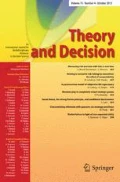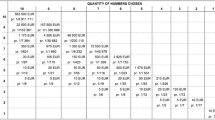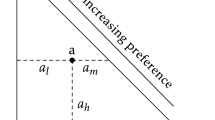Abstract
The possibility to interpret expected and nonexpected utility theories in purely probabilistic terms has been recently investigated. Such interpretation proposes as guideline for the Decision Maker the comparison of random variables through their probability to outperform a stochastic benchmark. We apply this type of analysis to the model of Becker and Sarin, showing that their utility functional may be seen as the probability that an opportune random variable, depending on the one to be evaluated, does not outperform a non-random benchmark. Further, the consequent choice criterion is equivalent to a sort of probability of ruin. Possible interpretations and financial examples are discussed.
Similar content being viewed by others
References
Ash, R.B. and Doléans-Dade, C.A. (2000), Probability and Measure Theory, Academic Press, London.
Bauer, H. (1981), Probability Theory and Elements of Measure Theory, Academic Press, London.
Becker, J.L. and Sarin, R.K. (1987), Lotterydependent utility, Management Science 33, 1367–1382.
Becker, J.L. and Sarin, R.K. (1989), Decision analysis using lottery-dependent utility, Journal of Risk and Uncertainty 2, 105–117.
Bordley, R. and Li Calzi, M. (2000), Decision analysis using target instead of utilityfunctions, Decisions in Economics and Finance 23, 53–74.
Castagnoli, E. and Li Calzi, M. (1996), Expected utilitywithout utility, Theory and Decision 41, 281–301.
Castagnoli, E. and Li Calzi, M. (1999), Nonexpected utilitytheories and benchmarking under risk, Szigma 29, 199–211.
Cigola, M. and Modesti, P. (1996), On SSB utilitytheory, in Bertocchi, M., Cavalli, E. and Komlosi, S. (eds.), Modelling Techniques for Financial Markets and Bank Management, Phisica-Verlag: Heidelberg, pp. 272–284.
Lloyd, E. (1980), Probability, in W. Ledermann, (ed.), Handbook of Applicable Mathematics, II, John Wiley, New York.
Meyer, J. (1989), Stochastic dominance and transformations of random variables, in Fomby, T.B., Seo, T.K. (eds.), Studies in the Economics of Uncertainty, Springer-Verlag, New York, pp. 45–54.
Rényi, A. (1970), Probability Theory, North-Holland, Amsterdam.
Author information
Authors and Affiliations
Corresponding author
Rights and permissions
About this article
Cite this article
Modesti, P. Lottery-Dependent Utility via Stochastic Benchmarking. Theory and Decision 55, 45–57 (2003). https://doi.org/10.1023/B:THEO.0000019077.14252.9c
Issue Date:
DOI: https://doi.org/10.1023/B:THEO.0000019077.14252.9c




